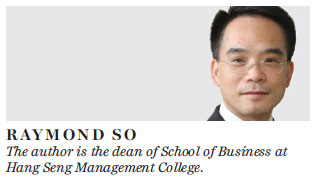US interest rate policy and its impact on the HK economy
Updated: 2015-09-24 09:37
By Raymond So(HK Edition)
|
|||||||||
Last week the United States Federal Reserve decided not to raise interest rates, a move in line with market expectations. Prices of interest rate futures suggest that the odds of the Fed raising rates in September are less than 25 percent.
There has been a lot of speculation over the Fed's policy on interest rates. From Ben Bernanke to Janet Yellen, the chair of the Fed board has repeatedly said US interest rates will eventually be raised. However, when asked about the timing of the first rate increase, the Fed chair is very careful in her use of words. Yellen is understandably trying to leave some room for policy maneuvers by avoiding giving a clear signal. Nevertheless, even if interest rates do not increase this year, they will next year. The question is by how much they will increase. Since interest rates in Hong Kong follow those in the US, an increase in the US will eventually have a negative impact on the city's economy. With the economic outlook for Hong Kong becoming uncertain, the risks associated with interest rate hikes cannot be overlooked.
The effects of the earlier mainland stock market crash have gradually emerged, with Hong Kong shares falling more than 20 percent from their peak. Meanwhile, the downturn facing the mainland economy is also affecting Hong Kong's economy a great deal. For example, mainland visitors have declined significantly over the past few months, affecting the local retail sector and tourism. Economic activities are always interlinked. When one industry does not perform well, this can have a negative impact and the impact can spread to other industries. In a normal business cycle, the downturn in one sector can be absorbed by other sectors as long as it is not systemic. But for Hong Kong, the impact of US interest rate hikes is systemic. The odds on other industries absorbing the downturn in the retail sector are low as they are now faced with the problem of rising operating costs. This does not bode well for the labor market; anticipated interest rate hikes definitely will not help.
For companies, many important decisions about human resources, such as salary increases and additional head counts, are made in the fourth quarter of every year. Hong Kong employers generally rely on published research reports by human resource consultants as their key reference for pay adjustments. Due to the uncertain outlook described above, companies will be more conservative in their decisions about human resources. Firms will also exercise caution on pay rises. Many companies will prefer to pay floating salaries, or bonuses, over increases in fixed salaries. To make the bonus system work, they have to provide incentives to employees. However, this will affect stability and long-term planning because the emphasis is on short-term performance bonuses. With the uncertain economic outlook in the coming year, companies are likely to focus on this short-term approach to do business. A negative consequence is that businesses tend to become focused on the short term, often sacrificing a more forward-looking approach.
When a company focuses more on short-term goals, the immediate effect is a decrease in demand for labor. Under the current tight labor market conditions, a decline in labor demand will relieve pressure on the labor market. However, this relief is not due to the increase in labor supply, which means that the relief in the labor market will result in a higher unemployment rate in future. In this case, businesses will tend to substitute temporary or part-time staff instead of permanent ones whenever old staff members depart. Clearly this will not be good news for workers. Furthermore, the corporate sector in the coming year will face new changes like the Mandatory Provident Fund review and the passing of standard working hours legislation. Companies will therefore be more cautious in hiring. If the market is booming, the corporate sector has a higher chance of coping with these changes. But when economic uncertainty is high, changes will increase sources of concern for companies.
US interest rate changes have more direct impact on asset markets. The Hong Kong Monetary Authority has said that interest rates may affect the real estate market. Also, a number of international financial institutions have issued research reports suggesting property prices are likely to correct soon. Since people expect interest rates will increase, many housing estates have recorded low or even no transactions in recent weeks. Will the real estate market correct due to an interest rate increase? Will this lead to another wave of negative external effects? These are scenarios which are worrying. For those who experienced the financial turmoil in 1997, the market crash is still fresh in their memories.
US interest rate decisions will affect global economies. There will be a tough year ahead for Hong Kong. In the forthcoming policy address and the budget, we must prepare for difficult economic conditions in future.

(HK Edition 09/24/2015 page9)